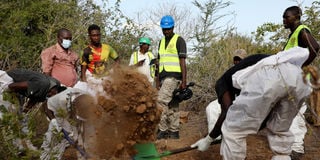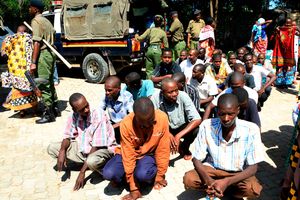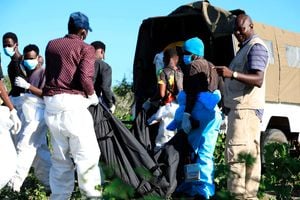
The exhumation exercise in Shakahola forest on June 5, 2024.
The Shakahola tragedy continues to represent one of Kenya’s darkest chapters, highlighting the devastating effects of unregulated religious activities in a society witnessing a surge in the number of evangelical churches.
The massacre, allegedly orchestrated by suspected cult leader Paul Mackenzie of the Good News International Church (GNI), resulted in the deaths of over 429 people, many of whom were discovered in shallow graves in Shakahola Forest, Kilifi County.
Another 600 individuals believed to be his followers are still missing and unaccounted for.
The legal proceedings regarding these atrocities, which include charges of manslaughter, child abuse, extremist activities, and murder against Mackenzie and his 94 associates, have become a litmus test for the justice system in Kenya.
The quest for justice has not been a straightforward journey but rather one filled with numerous challenges due to the magnitude of the Shakahola case and the number of suspects and witnesses involved, as well as the exhibits and state officers required to effectively conduct the prosecution, which has strained the prosecutorial systems.
238 counts of manslaughter
There are four separate ongoing trials in different courts regarding the atrocities committed in that forest, highlighting the complexity of ensuring accountability for such heinous crimes.
These four trials are at different stages as the state seeks to determine who was involved in the massacre and the roles they played.
Before Chief Magistrate’s court in Mombasa, Mackenzie and 94 of his accomplices are facing 238 counts of manslaughter.
These charges arise from the deaths of 429 members of the GNI church between January 2021 and September 2023.
The prosecution has accused these suspects of participating in a suicide pact intended to cause their own deaths and those of others.
18 witnesses
So far, the prosecution has presented evidence from 18 witnesses and marked 281 exhibits. The trial before Chief Magistrate Alex Ithuku has proceeded largely smoothly, except for last month when the Office of the Director of Public Prosecutions (ODPP) requested an adjournment, citing a lack of adequate prosecutors.
This followed the court being informed that the prosecutors handling the case, Mr Hillary Isiaho and Alex Gituma, had been transferred and were to report immediately to their new stations.
Another team that usually joins Mr Gituma and Mr Isiaho in the prosecution, which includes Senior Assistant Director of Public Prosecutions Jami Yamina, along with his colleagues Victor Owiti and Betty Rubia, could not travel to Mombasa due to a lack of resources.
Initially, it was claimed that the three had been assigned a different task, but it later emerged that the ODPP did not have the funds to facilitate their travel to Mombasa. The ODPP has maintained that the Shakahola case is complex, involving extensive paperwork, production, and marking of exhibits during hearings, and therefore cannot be effectively managed by a single prosecutor.
The Tononoka Children’s Court is handling charges related to the violation of children’s rights. Mackenzie and 29 associates are accused of infringing upon children’s right to education, as well as torture and cruelty.
Shakahola Forest
The prosecution has presented evidence from 23 witnesses, many of whom are minors, to illustrate the suffering endured by children under Mackenzie’s influence and supervision.
The offences, allegedly committed in Shakahola Forest over two years, include whipping children and denying them access to basic education. While the state has made significant progress in this case, financial constraints have recently compelled the ODPP to seek an adjournment, further delaying justice.
In Shanzu Court, Mackenzie and his 94 accomplices face charges of engaging in organised criminal activity, promoting extremist ideologies, and facilitating acts of terrorism. Among the accusations is the promotion of fasting to death as a religious practice.
The prosecution has presented 18 witnesses, including former pastors from various GNI branches. These testimonies aim to demonstrate the organised nature of Mackenzie’s activities and the devastating impact they had on vulnerable followers. This trial before Principal Magistrate Leah Juma has progressed smoothly without hitches since it began early this year.
However, the latest developments in the two other cases threaten to derail its smooth progress if the issue of financial constraints is not addressed before the next trial date in January next year.
The most serious charges are in the Malindi High Court, where Mackenzie and 30 others are accused of murdering 191 children. The suspects allegedly orchestrated the deaths of these children between January 2021 and September 2023, with victims such as Nathan Mathu, Evabra Dito, and Seth Ngala listed in the charge sheet as having been killed during the deadly fast.
However, this trial has encountered significant delays. Mackenzie successfully applied to have the charges reduced from 191 counts to 12.
In a ruling issued on May 17, Justice Mugure Thande determined that prosecuting Mackenzie and his associates on information containing 191 counts of murder was neither in the public interest nor conducive to the administration of justice.
The judge also found that the charge sheet was overloaded and directed that the charges be amended to reduce the counts to no more than 12.
“An overloaded charge will clearly cause delays in the conclusion of the trial. This will lead to a violation of the accused's right to a fair hearing as guaranteed under the law, particularly the right to an expedited hearing,” said the judge.
Justice Thande observed that it would be virtually impractical to manage a trial with 191 counts of murder, which she indicated is likely to be prolonged.
However, the ODPP, through Mombasa Senior Assistant Director of Public Prosecutions Peter Kiprop, has challenged this decision at the Court of Appeal.
The appellate court is scheduled to rule on this matter in April next year, leaving the trial in limbo with no witnesses called to testify yet.
Despite the above cases proceeding smoothly since the hearing commenced earlier this year, a teething problem has emerged, threatening to halt these trials.
The financial challenge disclosed by the ODPP is likely to jeopardise the proceedings, putting justice for the victims and their families at risk.
The ODPP has acknowledged facing severe cash shortages, which have affected its ability to facilitate prosecutors’ travel and preparation.
This issue was highlighted during the Tononoka Children’s Court trial, where State Counsel Victor Simbi revealed that financial difficulties had made it impossible to bring prosecutors to Mombasa to lead witnesses.
“The agencies handling the matter are experiencing a cash crunch; it has become difficult to facilitate officers to travel and prosecute the case,” Simbi stated.
In a letter to the court, the ODPP cited these constraints as the reason it could not proceed with scheduled hearings for three weeks in late November, requesting an adjournment until February next year to allow the office to get its house in order.
Financial problems
The shortage of personnel has further compounded these challenges. Prosecutors handling the Shakahola cases have been transferred, leaving the remaining team stretched thin.
According to Mr Simbi, the complexity and seriousness of the case necessitated a dedicated team of seven prosecutors, but logistical difficulties and transfers have disrupted this arrangement.
“Even if new prosecutors were to become available, they would still request time to familiarise themselves with the case before being ready to lead witnesses in presenting evidence before this court,” the prosecutor told Mr Ithuku.
However, the defence lawyer has not taken kindly to these delays. Mr Laurence Obonyo has opposed any postponements, arguing that the state’s financial problems should not hinder the accused's right to a fair and timely trial.
“The lack of preparation due to a cash crunch should not be a reason for adjournment. The ODPP is an independent institution with adequate funding,” Mr Obonyo argued.
The courts have acknowledged the gravity of the Shakahola trials and the public interest they represent. Principal Magistrate Nelly Chepchirchir of Tononoka Children’s Court expressed reluctance to grant prolonged adjournments, stating that the delays would prejudice both the victims and the accused.
“The prosecutors can handle the case from the comfort of their offices virtually; they do not have to travel to Mombasa to prosecute the matter,” Chepchirchir noted and ordered the trial to continue after granting a two-day adjournment.
But this did not help, as the ODPP only managed to present one witness before rushing to the High Court to block the trial from proceeding on the scheduled date.
Records show that Justice Wendy Micheni issued orders on November 28, staying the proceedings before the children’s court.
“This court calls for the records of the subject criminal case to satisfy itself as to the correctness, legality, and propriety of the court’s rulings of November 25 and 27, and the regularity of the proceedings leading thereto,” said the judge.
In those two rulings, Ms Chepchirchir declined to adjourn the hearing to February next year as requested by the ODPP.
The defence fears that this back-and-forth between the ODPP and the court could further delay the trial, thereby infringing on the rights of the suspects, the victims, and their families who are waiting for justice to be served expeditiously.
The ODPP has, however, maintained it is committed to ensuring justice is served for both the suspects, victims and their families.












